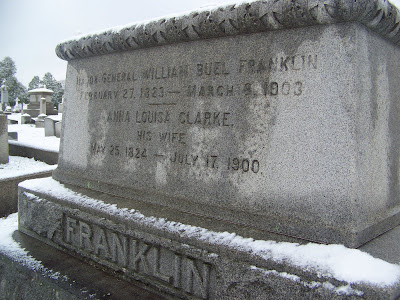
* * * * * * * * * * * * * * * * * * * *
Basket business found me in dowtown York this snowy morning. My wife, Laura, is participating in a Food & Beverage show this weekend and I figured I would help her set up. The arena opened to vendors at noon, but I headed off to York early so I could spend some time tramping around the city's famed Prospect Hill Cemetery. At over 325 acres and more than 90,000 burials, Prospect Hill is an enormous "city of the dead." And being wholly fascinated by cemeteries of all shapes and sizes, I braved the elements--it was frigidly cold with snow flurries--and snapped well over 100 pictures of this truly impressive, yet at times eerie graveyard.
* * * * * * * * * * * * * * * * * * * *
Upon entering the cemetery through the main gates, one is met by a vast sea of American flags, each one representing a soldier killed in either Iraq. . .
 . . .or Afghanistan.
. . .or Afghanistan.  Lining George Street, which runs parallel to Prospect Hill, are several banners paying tribute to those soldiers from York and its environs who have paid their last full measure of devotion while fighting for our nation and defending our freedoms.
Lining George Street, which runs parallel to Prospect Hill, are several banners paying tribute to those soldiers from York and its environs who have paid their last full measure of devotion while fighting for our nation and defending our freedoms.  Breathtaking.
Breathtaking. 
* * * * * * * * * * * * * * * * * * * *
 Up the hill and just several hundred yards from the main gates is this statue to a Civil War soldier, which was erected in honor and "In Memory of the Defenders of the Union: 1861-1865." Surrounding the soldier statue lie buried scores of fallen Union troops, many of them--in fact, most of them--buried here died while in the York General Hospital from wounds received at Gettysburg.
Up the hill and just several hundred yards from the main gates is this statue to a Civil War soldier, which was erected in honor and "In Memory of the Defenders of the Union: 1861-1865." Surrounding the soldier statue lie buried scores of fallen Union troops, many of them--in fact, most of them--buried here died while in the York General Hospital from wounds received at Gettysburg. * * * * * * * * * * * * * * * * * * * *
There are hundreds of Civil War veterans buried throughout Prospect Hill's 325+ acres, including John Henry Denig, recipient of the Medal of Honor for gallantry at the battle of Mobile in August 1864. . .
 and many more.
and many more. 

But perhaps Prospect Hill's most famous Civil War burial is Major General William Buel Franklin. Franklin, a premier civil engineer whose Civil War service left much to be desired (especially at the battle of South Mountain on September 14, 1862), died in March 1903. He was one of the longest living, high-ranking Federal officers of the war.



* * * * * * * * * * * * * * * * * * * *
Prospect Hill contains burials dating to the late 18th Century. . .
 . . .and there are buried within the cemetery gates, veterans from all of America's wars.
. . .and there are buried within the cemetery gates, veterans from all of America's wars. Including the Revolution. . .

 . . .and the War of 1812.
. . .and the War of 1812.  * * * * * * * * * * * * * * * * * * * *
* * * * * * * * * * * * * * * * * * * * Prospect Hill is even the final resting place of one of this nation's Founding Fathers: Philip Livingston, who signed the Declaration of Independence.



* * * * * * * * * * * * * * * * * * * *
The statuary and tombstones of Prospect Hill are incredible. . .






* * * * * * * * * * * * * * * * * * * *
View from atop Prospect Hill, looking over the city of York. . .

* * * * * * * * * * * * * * * * * * * *


